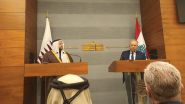
"Break the taboos; we demand peace," declared Marcel Ghanem, host of Lebanon’s premier talk show. "Demanding peace [with Israel] is not a crime," he emphasized, challenging entrenched narratives. Marwan Hamade, a seasoned Druze lawmaker, appeared on I24 News (French service) to discuss Gaza, signaling a willingness to defy Lebanon’s surreal boycott laws. Pundit Tony Karam condemned deceptive negotiations with Israel and delusions of victory over it, writing, "It’s time for political courage." A group of anonymous Lebanese launched the "Lebanon Israel Initiative" to foster dialogue and cooperation between the neighboring nations.
Yet, the Lebanese state, cowed by Hezbollah’s influence, remains deaf to these calls for peace and criminalizes dialogue, blatantly violating fundamental liberties and human rights. This suppression stifles voices seeking reconciliation and undermines Lebanon’s democratic principles.
Hezbollah employs multiple tactics to vilify Lebanese peace supporters. The pro-Iran militia unleashes venom on social media, recording videos, circulating them widely, shaming advocates, and demanding their imprisonment. This orchestrated campaign aims to silence dissent and maintain Hezbollah’s grip on public discourse, insisting on upholding “Israel is the eternal enemy” as a non-negotiable national principle.
Such intimidation affects many, including Hamade, a survivor of a 2004 assassination attempt, likely orchestrated by Hezbollah operatives. Hamade later softened his stance, claiming a friend invited him to the interview, believing it was for a different outlet, not an Israeli channel. His retreat reflects the chilling effect of Hezbollah’s tactics.
In response to defiant peace advocates, Hezbollah intensifies its attacks. Beyond social media shaming, a Hezbollah-affiliated lawyer drags pro-peace Lebanese activists to court, charging them with treason. These legal assaults weaponize the judiciary to punish dissent, further eroding free expression.
In Lebanon, opponents of peace often conflate dissent over peace with Israel with acts of espionage. Anyone advocating peace risks being branded a traitor or spy, a dangerous oversimplification that shuts down legitimate debate.
Lebanon’s suppression of pro-peace voices—through courts and Hezbollah’s intimidation—undermines its global credibility.
Reluctance to embrace free expression may stem from a cultural tendency to view dissent as betrayal. A Palestinian militant once remarked, “One of my fears is that treason will one day become a point of view,” a phrase weaponized to stifle debate over recognizing Israel. This sentiment persists among some Lebanese, Palestinian, and Arab communities, reflecting a broader resistance to open dialogue.
Labeling dissent as betrayal is fundamentally misguided. Short of inciting violence or engaging in espionage, no opinion should be deemed treasonous. Freedom of expression, a cornerstone of open societies, must be upheld. Yet, Lebanon and others in the region often fall short. The state must protect open debate and stop harassing citizens engaging with Israelis. Guaranteeing free expression is not merely a legal obligation but a vital step toward a more inclusive, peaceful society.
Worse than Hezbollah’s bullying is the Lebanese state’s weakness. Rather than upholding the “freedom of expression” guaranteed by its constitution, Lebanon trades in half-truths — pretending to pursue peace to appease Washington while evading Hezbollah’s anger. Such duplicity erodes public trust and blocks progress.
When Lebanese officials mention talks with Israel, often misconstrued as peace overtures, they mean “indirect talks” through American mediators to “settle disputes”—a euphemism for border demarcation and a temporary truce rather than genuine reconciliation.
Occasionally, Lebanon clarifies it seeks a truce with Israel, stating it will sign peace only after a Palestinian state is established, aligning with Arab League policy. This stance subordinates Lebanon’s interests to a broader regional agenda.
Fifty-six years after surrendering sovereignty to Palestinian militias in 1969 and later to Hezbollah, Lebanon still prioritizes Palestinian interests over its own. Palestinians turned Lebanon into a launchpad against Israel, triggering devastating reprisals and igniting a civil war that scarred the nation.
Lebanon has sacrificed more for the Palestinian cause than Palestinians themselves, hosting refugees and enduring conflict. It’s time to recognize Israel, ratify a peace treaty, and normalize relations. This policy promises stability, attracts foreign investment, and revitalizes Lebanon’s economy. Ghanem urged Lebanon to put its national interests first — even if it means breaking the long-standing taboo over Palestine.
Until Beirut decriminalizes its citizens’ right to engage freely with Israelis — short of espionage — and recognizes peace as a policy open to debate rather than a pillar of national identity, progress will remain elusive. The state must foster an environment where ideas can be discussed without fear of retribution.
Pro-peace voices in Lebanon are growing louder, reflecting a yearning for change. May peace with Israel, built on mutual respect and cooperation, follow soon, ushering in a new era of stability and prosperity.




Comments